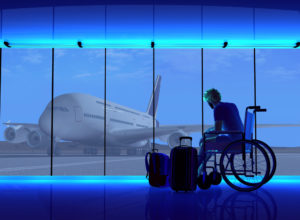New Law Mandates Creation of a Bill of Rights for Air Travelers with Disabilities
It may soon be a new day for airline travelers with disabilities. In a groundbreaking development, a new law directs the Federal Aviation Administration (FAA) to create a bill of rights for passengers with disabilities to protect their right to fly free of discrimination.
The change is part of the 1,200-page Federal Aviation Administration Reauthorization Act of 2018, signed into law October 05, 2018, by President Trump, reauthorizing the FAA’s funding for five years.
Although the Americans with Disabilities Act (ADA) governs federal disability discrimination law in airports, air travel is governed by the Air Carrier Access Act. The new law directs the FAA to create an Airline Passengers with Disabilities Bill of Rights expanding on the previous protections.
Specifically, the FAA must provide “plain language” descriptions of six basic rights:
- The right to be treated with “dignity and respect”;
- The right to receive timely assistance if requested;
- The right to fly with a wheelchair or other accessibility devices;
- The right to receive seating accommodations;
- The right to receive announcements in an accessible format; and
- The right to speak with a complaint resolution officer or to file a complaint with an air carrier or the Department of Transportation (DOT).
The law comes on the heels of a national outcry concerning numerous stories of harsh treatment of passengers with disabilities, such as D’Arcee Neal, a man with cerebral palsy who was forced to crawl off a United Airlines flight in 2015 to use the restroom after waiting for more than 30 minutes to be accommodated with a wheelchair.
Also as part of the legislation, the FAA must appoint an advisory committee to oversee the creation of the Bill of Rights. Civil penalties will increase if passengers are subjected to bodily harm, or their wheelchairs or other accessibility devices are damaged.
The Transportation Security Administration (TSA) must also revamp within six months its training procedures for accommodating people with disabilities.
Finally, the DOT must, within 18 months, propose federal regulations concerning service animals for travelers.
“In order to keep America’s promise of full equality for all, we must break down the barriers that individuals with disabilities and our veterans face when they travel,” Sen. Tammy Baldwin (D-WI) said in a news release from Paralyzed Veterans of America. “Equal access to air travel ensures our veterans are able to participate in today’s economy and enjoy their travel opportunities.”
For more on current protections for passengers with disabilities, click here.
